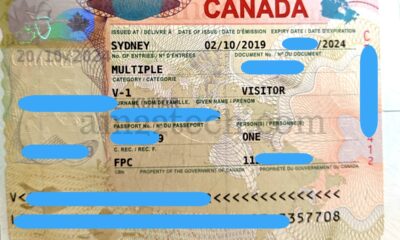Oppotunities
Canada opens new permanent residence pathway for Colombians, Haitians, and Venezuelans

On October 10th, Marc Miller, the Minister of Immigration, Refugees and Citizenship, made an announcement regarding Canada’s new humanitarian permanent residence pathway. This initiative will welcome up to 11,000 individuals from Colombia, Haiti, and Venezuela.
Starting this autumn, foreign nationals from Colombia, Haiti, and Venezuela residing in Central or South America, as well as the Caribbean, who have familial ties to Canada, will have the opportunity to apply for this fresh pathway. To qualify, the principal applicant must be a child, grandchild, spouse, common-law partner, parent, grandparent, or sibling of a Canadian citizen or permanent resident.
Successful applicants will receive pre-arrival services, including an assessment of their employment skills and a referral to a settlement provider organization in their intended Canadian community. More detailed information about this new pathway will be made available closer to its launch, as per the Immigration, Refugees and Citizenship Canada (IRCC).
Canada’s commitment to supporting migrants in the Americas was previously declared by the IRCC earlier this year, aiming to welcome 15,000 migrants on a humanitarian basis from the Western Hemisphere. The primary objective of this initiative is to offer a route to economic opportunities and mitigate forced displacement, serving as an alternative to irregular migration.
Within this initiative, the IRCC will create regular migration pathways, encompassing permanent resident humanitarian and economic pathways, as well as temporary work programs, for individuals in the Americas.
The announcement on October 10th is part of Canada’s pledge to welcome a total of 15,000 migrants, as indicated in the statement by Marc Miller. This includes the addition of 4,000 temporary foreign workers, some of whom have already arrived in Canada. Furthermore, the IRCC is collaborating with non-governmental organizations to support the Economic Mobility Pathways Pilot, which facilitates the immigration of skilled refugees and other displaced individuals to Canada.
The IRCC’s commitment to supporting migrants in the Americas extends to investments in projects across Latin America and the Caribbean. Marc Miller stated, “We are increasing our assistance for capacity-building efforts in the region by investing $75 million over six years for projects across Latin America and the Caribbean. These projects are designed to enhance asylum capacity and foster better integration of migrants and refugees into local communities and labor markets. This support will aid countries, including those from which refugees and migrants originate, transit through, or are hosted in, in addressing the challenges of irregular migration while also improving the quality of life for migrants and refugees.”























